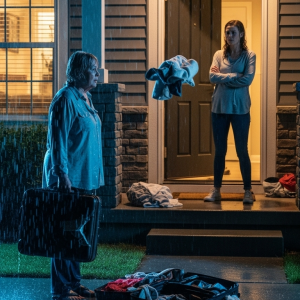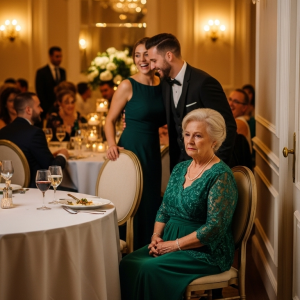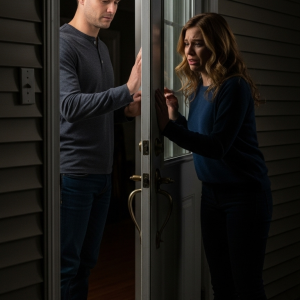I really thought I was finally getting my life together. At twenty-three, I’d just graduated from college and landed a promising internship. For the first time, things were actually going my way. I had worked tirelessly to get here, and a sense of pride was finally starting to feel earned.
Then, it all fell apart.
It started with an email from the bank. At first, I dismissed it as another generic notification. But when I opened it, my heart seized. A single line of text stared back at me, a number so absurd it felt like a typo.
It said I owed $170,000.
One hundred and seventy thousand dollars. I stared at the screen, my mind refusing to process it. This had to be a mistake. How could I possibly owe that much? My entire college tuition was supposed to be around $85,000—and that was before my scholarship. This number made no sense. My mind raced, grasping at straws. Maybe they added an extra zero by accident?
My hands started to shake. I had been so careful. I took out just enough in student loans to cover what my scholarship didn’t, and I worked part-time at a café to keep my expenses low. I was the responsible one. So where in the world did this astronomical figure come from?
The first thing I did was call my parents. I tried to keep my voice steady, but I could feel sweat beading on my forehead. My mom answered, and as I explained the situation, her response was unnervingly casual.
“Oh, don’t worry about it, sweetie,” she said, her voice distant. “It’s probably just a mix-up with the bank. We’ll sort it out.” She said it in that way she has when she’s not really listening, already moving on to the next thing on her mental to-do list.
“No, Mom, this is serious,” I insisted, my voice rising. “The bank says I owe $170,000. I need to know why.”
An awkward pause hung in the air. Then, she admitted they had taken out a loan in my name for college, but she insisted it shouldn’t be that high. She tried to brush it off again, telling me not to stress. But I wasn’t letting it go.
“Did you take out more than I needed?” I asked directly. “Like, the full amount, just in case?”
Silence. I could practically hear the gears turning in her head as she searched for the right words. Finally, she conceded. “Well, yes, we took out the full amount. It was just to make sure you had enough if your scholarship didn’t cover everything.”
I was speechless. Why would they take out so much unnecessary money? My scholarship had covered a significant chunk, and my job handled the rest. Why $170,000? As I pressed her, her story began to fray, until she let something slip that stopped my world from spinning.
“Well,” she said hesitantly, “your brother needed some help, too.”
My brain short-circuited. My twin brother, Evan, didn’t even go to college. He was too busy chasing a fleeting dream of becoming a model. The pieces clicked into place with sickening clarity. They had taken out a loan in my name and given a portion of it to him.
Who does that? Why would they put me in this position without even telling me? My voice grew louder. “How much did you give him? Why didn’t you just take out a separate loan for him?”
She dodged the questions, her voice a placating murmur about “figuring it out.”
“Figure it out?” I nearly shouted. “I have a six-figure debt hanging over my head, and you want to ‘figure it out’ later?”
I told her we needed to talk in person. She reluctantly agreed. After hanging up, I just sat there, my hands clenched so tightly my knuckles turned white. I had done everything right, and in one afternoon, I’d been blindsided by a betrayal so deep it felt like I was drowning.
When I arrived at my parents’ house that weekend, the first thing that struck me was the normality of it all. The manicured lawn, the familiar scent of my mom’s cooking—how could everything look so peaceful when my life had been thrown into chaos?
They were in the living room, their tense posture betraying that they knew what was coming. I skipped the small talk.
“I need to know what’s going on with this loan,” I said, my voice dangerously steady.
My dad sighed, launching into a tired speech about how they were only trying to do what was best for both me and Evan. It wasn’t good enough. I pushed for details: How much, exactly? How much went to Evan? And why was I the last to know?
He became defensive, talking about treating us “equally,” but the word felt like a slap in the face. After what felt like an eternity of evasions, they finally admitted it. They had given Evan $80,000 of my loan money.
Eighty. Thousand. Dollars.
I couldn’t breathe. Evan, who hadn’t set foot in a lecture hall, had been living it up on money that was now shackled to my name. I asked them why they didn’t get a loan for him. The excuses were pathetic: his grades weren’t good enough, they didn’t have other assets for collateral. It was all nonsense.
I was fuming, but I knew screaming wouldn’t solve anything. So, I looked them both in the eye and laid down the law.
“I am not paying one dime more than what my tuition cost,” I said flatly. “If Evan wants to burn through $80,000, that’s his problem. Not mine.”
My mom’s face paled. She immediately launched into a tirade about family responsibility, about how I was being selfish.
“Selfish?” I shot back, disbelief giving my voice a sharp edge. “I’m the one stuck with a crippling debt because you decided to bail out Evan without even asking me!”
I told them they needed to figure out how to pay back that $80,000, or Evan did. I wasn’t carrying that burden. By the time I left their house, I was angrier than ever. My world had been turned upside down, and the people who were supposed to be my anchor were the ones who had thrown me overboard. But one thing was certain: I would not go down without a fight.
After that disastrous confrontation, I spent days stewing, researching student loan laws, and trying to find a way out. The more I learned, the clearer it became that my parents had knowingly taken out far more than needed. But the real gut punch came when I dug through a box of old paperwork.
Back when I was eighteen and clueless about finances, my parents had me sign some forms. I trusted them. A big mistake. I discovered they’d had me sign over access to my bank account, allowing them to “manage my funds” while I was in college. They used that access to funnel the extra $80,000 to Evan without my knowledge or consent. The betrayal felt suffocating. These were the people who were supposed to protect me, and they had taken advantage of my trust to fund my brother’s whims.
This discovery fueled my resolve. It was time to confront Evan directly.
I waited up for him one night, the house dark and silent. When he walked in after midnight, I kept things casual at first, offering him coffee. He was completely unsuspecting. Finally, I brought up the loan, asking if he knew the trouble I was in because of the money our parents gave him.
He looked at me with genuine confusion. “What money?” he asked. “I didn’t get $80,000.”
That’s when I snapped. I laid it all out—the loan, the debt, the fact that I was the one responsible. He just sat there, his expression blank, until a flicker of recognition crossed his face.
“Oh, that,” he said, as if remembering a trivial detail. “I thought they just gave me some money to help out with stuff.”
Stuff. He thought they gave him a sum that could change a person’s life for… stuff.
“What did you do with it, Evan?” I demanded, my voice trembling with rage.
He shrugged, a casual, infuriating gesture. “I don’t know. Spent it, I guess. On trips, going out with friends… you know, the usual.”
The usual. He had spent my future on vacations and parties. I started yelling, telling him he had to pay it back, that it was his responsibility. He looked at me like I was insane.
“It’s not my fault Mom and Dad gave me the money,” he said with a laugh. “I didn’t ask for it.”
In that moment, I realized he felt no remorse. He didn’t care that I would suffer for his lifestyle. He was just going to keep on living his life, consequence-free.
I was done. “I’m not paying a single cent of that $80,000,” I seethed. “If you don’t figure out how to pay it back, I’m taking legal action.”
He just laughed again. “Good luck with that.”
I stormed out of the house, the injustice of it all burning in my chest. How did I end up here, with a family that used me as a financial tool and a brother who didn’t have a shred of decency? I knew then that I was done playing nice. If my family wanted a war, they were about to get one.
I couldn’t keep reacting. I needed to take control. I decided to give my parents one last chance to make things right before I burned everything to the ground.
I called and told them I was coming over. When I arrived, I didn’t let them steer the conversation. I calmly laid out the facts again, but this time, I added a new, unshakeable element.
“I’ve looked into it,” I began, my voice even. “What you did—taking out excess funds in my name, transferring them from my account without my explicit, informed consent—is grounds for a lawsuit. If you do not pay back the $80,000, I will take legal action.”
The room went dead silent. The panic in my mother’s eyes was real this time. My dad stared at me, trying to see if I was bluffing. He found no weakness.
My dad tried to reason, to negotiate. I shut him down. “This is your mess. You will clean it up.”
My mom started pleading, talking about how they didn’t have the money, how a lawsuit would destroy the family. I felt a pang of guilt, but I crushed it. They had put me through months of anxiety; their comfort was no longer my concern.
“I’m giving you two weeks,” I stated, my voice like ice. “Two weeks to present a formal plan to repay the money. If you don’t, I file the suit. No more discussions.”
My dad’s face hardened with anger. “You’re tearing this family apart over money!”
“No,” I corrected him. “You put me in this position. I’m just doing what I have to do to survive it.”
I left their house feeling emotionally scoured but, for the first time, in control. Over the next few days, I received a barrage of texts from my mom, full of guilt and pleas to reconsider. I didn’t budge. I just reminded her of the deadline.
As the two weeks drew to a close with no word, I prepared for the worst. I gathered every document, every email, every bank statement. I even consulted a lawyer.
On the final night, I lay in bed, staring at the ceiling, feeling like I was about to step off a cliff. The next morning, I woke to a text from my mom.
We’re working on getting the money together. Please don’t do anything yet.
It was a start. They were finally taking me seriously. I gave them one more week to produce a concrete plan. The ball was in their court, but I was no longer a player in their game. I was the referee.
After a tense week of waiting, my dad called. He didn’t apologize, but he said they had managed to pull together some money and would start paying me back in installments. It wasn’t a victory, but it was a ceasefire. I accepted, making it clear that if they missed a single payment, the lawsuit would be filed immediately.
The first few payments arrived. A fragile sense of hope began to bloom. Maybe, just maybe, we could move past this.
Then, the payments stopped.
No warning. No explanation. Just silence. Days turned into weeks. They weren’t just late; they had gone back on their word. Again. They had been playing me, hoping I would eventually give up.
I sent my dad one final text. I told him he had missed the payment and that he had until the end of the day to respond before I filed the suit.
Silence. The entire day was a blur of pacing and checking my phone. Finally, a text from my mom arrived. It was the same old story: things were difficult, they didn’t have the money, I needed to be patient.
I was done being patient. I texted back, my words sharp and final. I told her that I had given them enough time, and that tomorrow, it was over.
The next morning, as I was gathering my documents to meet my lawyer, my mom called, crying and begging me not to go through with it. For a moment, I wavered. But then I remembered every lie, every broken promise.
“I’ve given you every chance,” I told her, my voice devoid of emotion. “I’m not backing down.”
I hung up and walked out the door. Later that day, sitting in my lawyer’s office, I signed the papers that would officially pit me against my own parents in a court of law. It felt surreal. Word spread quickly through the family, and people took sides. Some called me brave; others called me ungrateful. It was hard, but I knew they didn’t understand the years of being taken for granted that had led to this moment. I was losing my family, but I was fighting for my future.
A few weeks after I filed the lawsuit, my lawyer called. My parents wanted to settle. The reality of legal fees and a likely loss in court had finally broken through their pride.
We met in the lawyer’s sterile conference room. They looked exhausted. My mom couldn’t meet my eye, and my dad just looked resentful. The talks were tense. They tried to negotiate for a lower amount, but my lawyer held firm.
In the end, they agreed to pay back the full $80,000, plus my legal fees. It was a hollow victory. I had won, but I had lost my family. Evan, predictably, was a no-show.
As we left, my mom whispered that she was sorry.
“It’s too late for apologies,” I said without looking at her. Actions speak louder than words, and their actions had been deafening.
A few days later, the money was in my account. I paid off the entire loan. I was finally debt-free, but the relief I expected was replaced by a quiet emptiness.
I’m moving on now. My internship became a full-time job, and I’m looking at apartments in a new city—a fresh start. Sometimes I wonder if I did the right thing, if I should have just taken the hit to keep the peace. But then I remember the feeling of being used, of being seen as less important than my brother, and I know I did what I had to do.
Doing the right thing doesn’t always feel good. Sometimes, it just feels necessary. This whole mess taught me that I’m stronger than I ever knew, and that sometimes, the only way to find peace is to walk away from the people who keep breaking you. I don’t know what the future holds, but for the first time, I’m ready to live it for myself.




